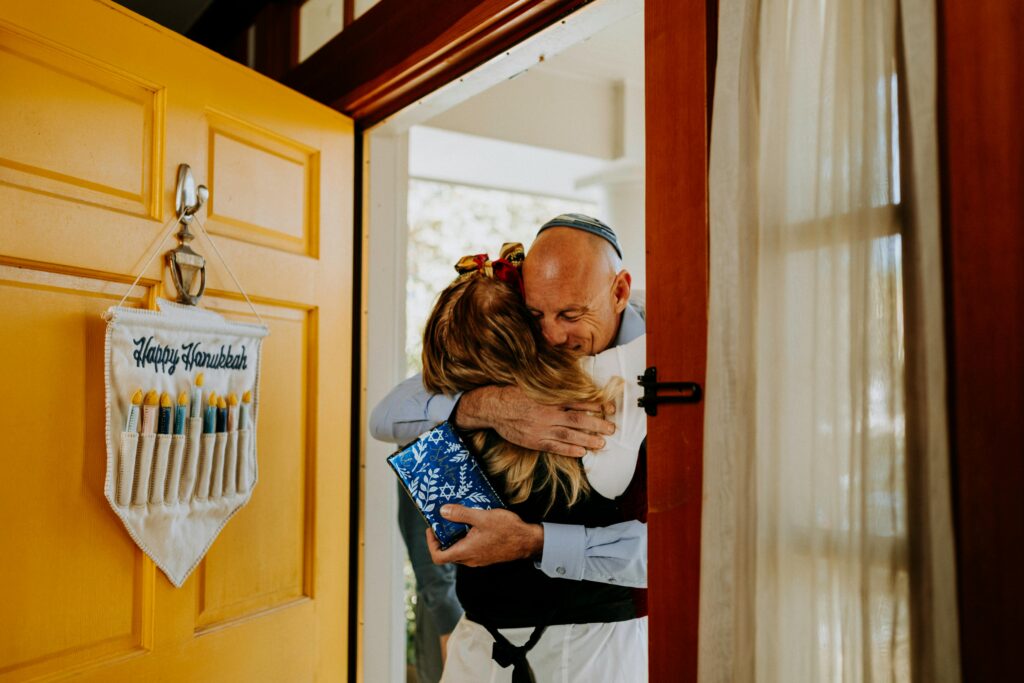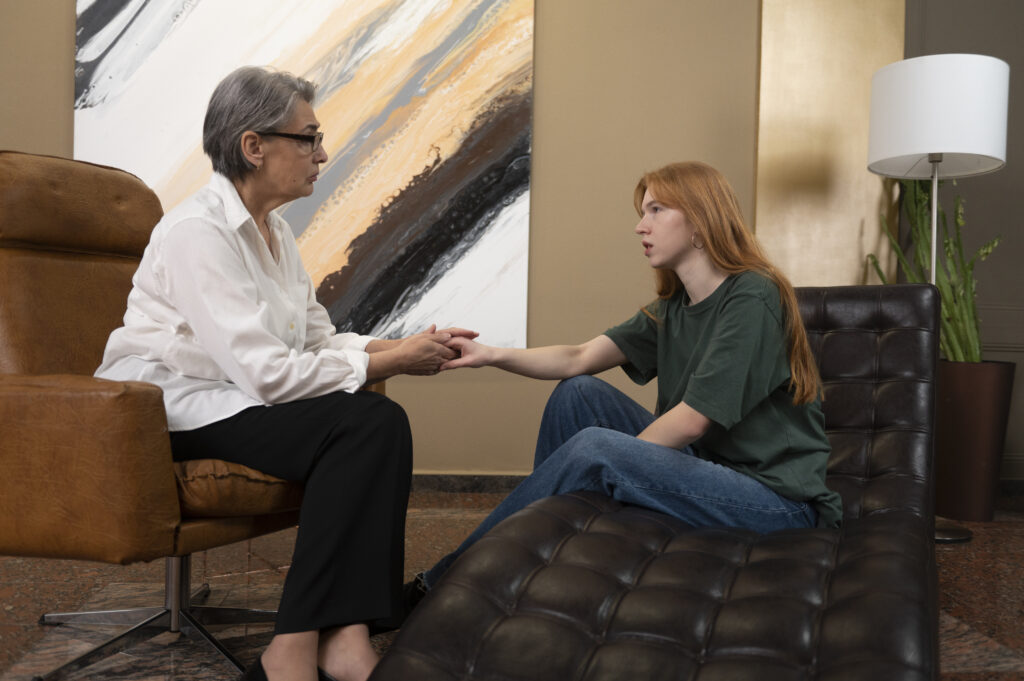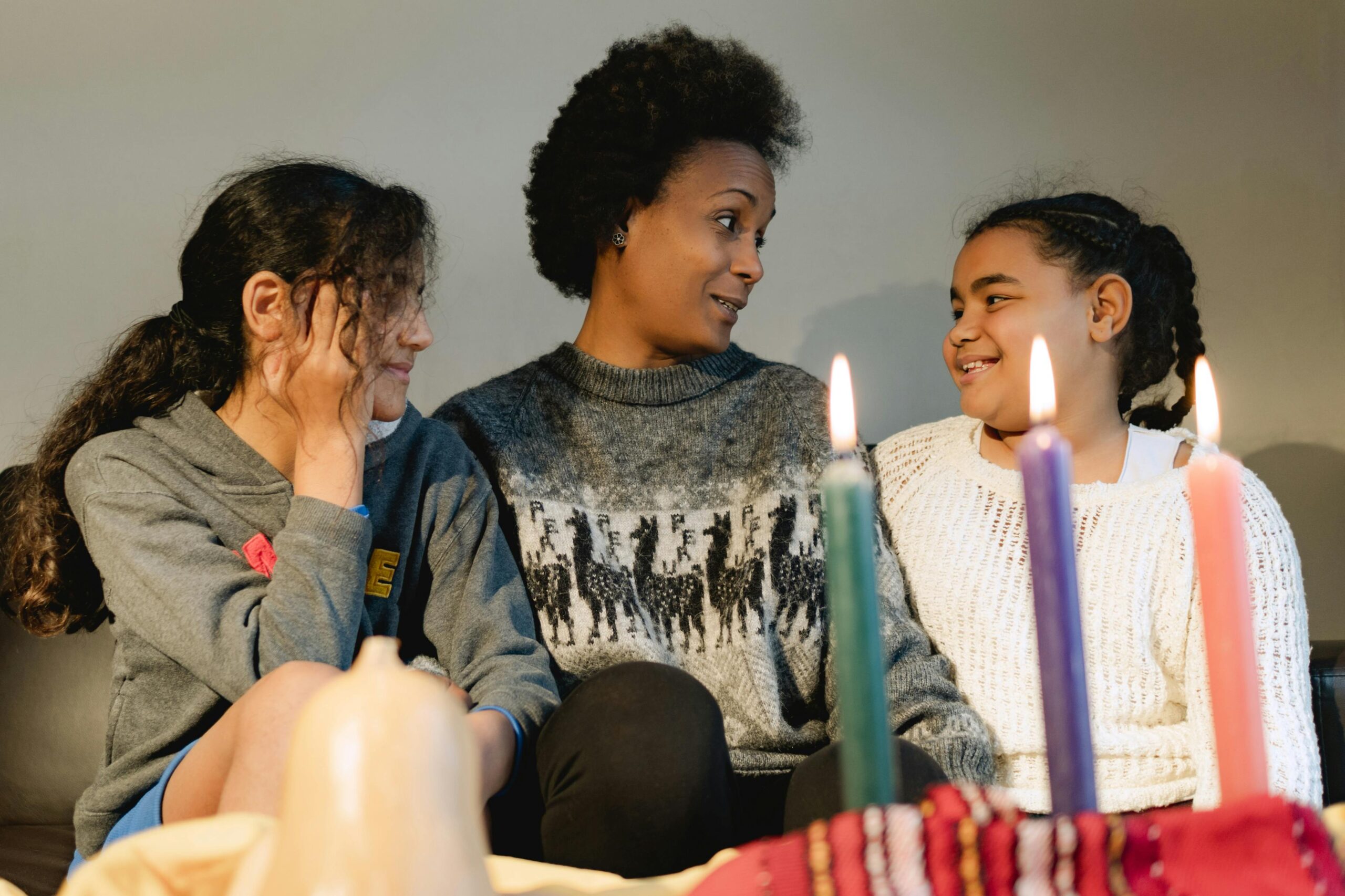While the holidays are filled with messages of cheer and celebration, they can also amplify feelings of loss and sadness. Between constant reminders of togetherness, holiday traditions that no longer feel the same, and the pressure to be cheerful, grief can feel heavier and more isolating.
If you’re moving through loss this season, know this: you’re not doing it wrong. Grief has no timeline, and it often resurfaces most strongly when life is asking you to celebrate. There are steps you can take on your own to care for yourself and make space for healing, and therapy can be a supportive space to process this pain.
Acknowledging the Pain
One of the most healing things you can do is to allow yourself to feel your emotions as they come without judging or rushing them. Grief can bring sadness, anger, guilt, relief, or even numbness, and all of those are valid responses to loss.
To acknowledge pain means simply naming what you feel. You might sit quietly for a few minutes each day and ask, “What’s here right now?” Then just notice what’s coming up for you without trying to fix it. Journaling, gentle movement, or speaking aloud to someone you trust can help give shape to emotions that feel overwhelming.
If you find yourself avoiding feelings by staying overly busy or detached, it can help to set aside small moments. Even ten minutes in the morning, a short walk after dinner just to check in with yourself can be grounding. It’s not about making the pain go away, but giving it a place to exist safely.
Research shows that emotional awareness and expression are key components of healthy grieving (link). In therapy, this process is guided and supported. A therapist helps you identify what you’re feeling, validate your experience, and find language for emotions that may feel impossible to express. A therapist can also just be there with you as you move through the immense pain that comes with loss.
Finding Meaningful Ways to Honor Your Loss

Many people feel torn between wanting to honor their loved one and wanting to protect themselves from further pain. Finding small, meaningful ways to include your loved one in your holiday season can bridge that gap.
You might light a candle, cook their favorite meal, write them a letter, or create a new ritual that keeps their memory present in a way that feels gentle. It can also help to talk about them—to share stories or photos with others who knew them. Continuing bonds like these have been shown to support emotional healing, helping people integrate loss into their lives in healing ways (link).
If you’re not sure where to start, therapy can help you explore what feels right for you. A therapist won’t push you to revisit painful memories before you’re ready but can help you find rituals that bring connection instead of avoidance.
Managing Expectations and Setting Boundaries
The holidays can also come with social pressure to attend gatherings, buy gifts, or show up with energy you might not have. It’s okay to say no. Setting boundaries isn’t selfish; it’s self-preservation.
You might decide to attend only part of an event or let friends know ahead of time that you may need to step away early. If you can, communicate your needs directly: “I’d love to join, but I may leave early if I need to.” Having a plan helps reduce anxiety and lets you stay connected without feeling trapped.
When guilt shows up (“I should be there,” “I don’t want to disappoint anyone”), remind yourself that grief is a full-time job. Therapy can help you work through these internal conflicts, especially if people around you don’t fully understand what you’re going through.
At Manhattan Wellness, many clients come to therapy during this time not because they want to “fix” their grief, but because they want to give it structure. Talking about loss in a space designed for healing allows you to find balance between protecting yourself as you grieve and staying connected to others.
Taking Care of Your Body
Grief doesn’t only live in your mind; it lives in your body too. You might feel exhausted, tense, or numb. Sleep and appetite can shift. It’s common to overlook physical needs when your emotional world feels heavy, but tending mindfully to your body is one of the most compassionate things you can do.

Try to maintain simple, supportive routines: drinking enough water, eating regularly, stepping outside for fresh air. Gentle movement—like walking, stretching, or yoga—can help release some of the physical tension that grief creates. Mindful breathing, even for a minute or two, can calm your nervous system when emotions spike (link).
Therapists often help clients integrate somatic (body-based) tools like grounding exercises or relaxation techniques to manage the physical side of grief. These can make emotional processing more sustainable when feelings feel too big to hold all at once. It can be helpful to work with a therapist to find a routine or practices that work for your body as you process grief.
Letting Go of “Shoulds”
You may notice thoughts like “I should be over this by now” or “I should feel grateful for what I have.” Grief doesn’t follow rules, and there’s no timeline for when things are supposed to feel easier.
Give yourself permission to experience both grief and joy. They are both valid and sometimes can appear even in the same moment. You might laugh during dinner and cry afterward. You might cancel plans one day and want connection the next. Both are okay.
In therapy, you can explore these “shoulds” and uncover where they come from. For many people going through loss, cultural, family, or social expectations don’t leave space for real emotional complexity and grief. Releasing those narratives helps you move through grief at your own pace, without guilt and on your own terms.
Creating Supportive Connections

When you’re grieving, isolation can feel safer, but connection is what ultimately helps us heal. Reach out to someone who feels safe—a friend who listens without judgment, a relative who shares your memories, or a therapist who can hold space for both your pain and your growth.
Even a small act of connection, like texting a friend to say, “This week feels hard,” can remind you that you don’t have to carry grief alone.
If you find that loved ones don’t know how to support you, therapy can fill that gap. At Manhattan Wellness, our therapists provide both emotional guidance and practical coping tools—so you can move through grief without feeling disconnected from yourself or others.
When to Reach for More Support
Sometimes, grief feels unmanageable. If your sadness feels constant, your sleep or appetite is severely disrupted, or you’ve lost interest in things that usually comfort you, it may be time to reach out for professional help. Grief can overlap with depression or anxiety, and a therapist can help you differentiate between the two while offering strategies for relief (link).
At Manhattan Wellness, we specialize in helping clients navigate grief in all its forms—recent loss, long-term loss, or the grief that resurfaces years later. Therapy gives you tools to move through the holidays with compassion for yourself, to create new meaning without erasing what you’ve lost, and to reconnect with moments of peace when they come.
You don’t have to face it alone. Our therapists are here to walk alongside you, one conversation at a time.
Ready to take the next step? Here’s how:
- Submit a Contact Form or Email Us at hello@manhattanwellness.org
- Learn More About Our Team of Therapists and Our Therapy Specialists
Final Thoughts
The holidays can be complicated when your heart is heavy. You don’t have to pretend to be okay. You can grieve and still find small moments of beauty. You can miss someone deeply and still make space for new memories. Grief changes you, but it can also open space for new meaning.
At Manhattan Wellness, we believe healing isn’t about forgetting. Over time, you learn to carry what matters forward, to hold both love and loss in the same breath, and to trust that life can be full again—even as you keep those you’ve lost close in new ways.
Learn more about how we can support you as you navigate loss:
- Submit a Contact Form or Email Us at hello@manhattanwellness.org
- Learn More About Our Team of Therapists and Our Therapy Specialists
OTHER THERAPY SERVICES AT MANHATTAN WELLNESS IN MANHATTAN, WESTCHESTER, BROOKLYN & THROUGHOUT NEW YORK
At Manhattan Wellness, our therapists are here to support you in navigating every aspect of life. This is why we offer a variety of services to ensure you get the support, care, and guidance necessary. The therapy services we offer are Therapy for Maternal Mental Health, Self-Esteem Counseling, and Anxiety Treatment. Along with Dating/Relationship Counseling, Counseling for College Students, and more.
